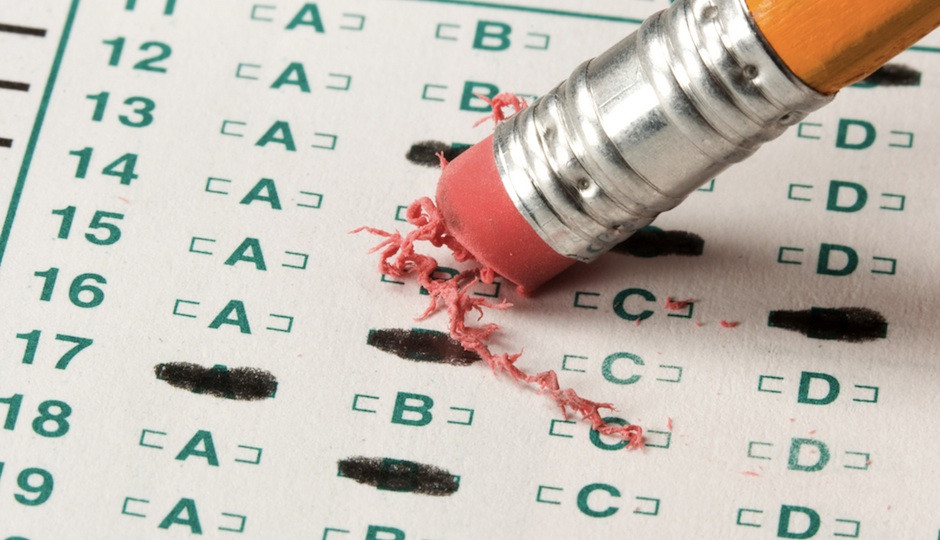In South Jersey, District Instructs Families How to Opt Out of Testing

Via Shutterstock.
Haddon Township School District isn’t necessarily against PARCC, the highly controversial standardized education assessment that has been adopted by dozens of states nation-wide. But district officials are telling parents how their kids can get out of taking it. And parents opposed to the test are hailing it as a win.
In a letter dated January 26, 2015 (below), District Superintendent Dr. Nancy Ward outlined Haddon Township’s provisions for parents who wish their children to be exempt from the high-stakes exam, which has come under fire by education advocates in other states: Trisha Kocanda, a superintendent outside of Chicago, wrote an open letter on PARCC, which was later published in The Washington Post. In it, Kocanda said she was “wary. We are concerned about the amount of instructional time it will displace, the impact this will have on students, and the usefulness of the results.”
The exam, which is administered via computers, takes between 13 and 14 hours to complete. Recently, a group of concerned parents and teachers took to Trenton to voice their concerns: One parent claimed that, as an adult, she could not complete the third-grade version of the test because it was too difficult (a common concern from both parents and teachers alike). An educator from Flemington, New Jersey, said the test makes her feel like she’s “living in a bad dream and can’t wake up.”
In the Haddon Township letter, Dr. Ward says that although there are federal regulations regarding district funding and PARCC participation, New Jersey has yet to issue such guidelines:
“There is no provision from the New Jersey Department of Education for non-participation in state assessments at this time. Districts are left to address situations in which families disallow their children’s participation.”
However, regular classroom attendance is linked to state funding, a point Dr. Ward makes later in her letter. She outlines the following protocol for parents who wish to withdrawal their children from taking PARCC (the full letter is below):
- “Parents/Guardians who choose to disallow participation must submit a written statement to the building principal prior to the actual dates of testing, documenting their intention to have their child not participate in the PARCC.”
- “Students whose families have submitted a written statement disallowing participation in the assessment are expected to come to school on the days of the testing, where they will be marked present. They will be located in a room with adult supervision that is separate from the testing environment.”
In other words: You don’t have to take the test, but please show up to school!
More importantly, Dr. Ward adds the following:
“We have not been given clear guidance by the DOE regarding recording and reporting on the state system or college transcripts when a student does not test. We will follow state guidelines when we receive them. From a district perspective, non-participation with a written statement from a parent/guardian will not affect student grades or attendance records.”
Parents, who responded to the publication of the letter on the “Save Our Schools New Jersey” Facebook page, were largely pleased with the measure: One wrote, “Woohoo! Glad our school was proactive.” Another also joined in the celebration, stating, “Yay for Haddon Twp!!!” Others stated they were going to print the letter out and bring it to their own districts as a measure to fight the mandatory administration of the exam.
Haddon Township isn’t alone: It is one of a growing number of school districts in New Jersey that is offering parents the ability to opt their children out of PARCC. Union Township Schools issued a statement, saying the exam, “creates anxiety and stress for students, parents, teachers, administrators, and yes, even board of education members.” Princeton School District created a detailed website that explains parent and student rights regarding the examination.
So, are the actions of these school districts legal; in other words, is there a loophole to prevent students from taking the PARCC? We reached out to the New Jersey Department of Education. Michael Yaple, the Department’s Director of Public Information and Strategic Partnerships, said, “It really wouldn’t be appropriate for the Department of Education to evaluate or discuss a local school board’s policies.” He went on to say, “Encouraging children not to take the state assessments would deny schools valuable data it could use to improve instruction,” and that PARCC assessments “are a tool to ensure teacher accountability.”
Calls to the Haddon Township Superintendent’s Office were not returned.
Follow @BryanB82 on Twitter.


